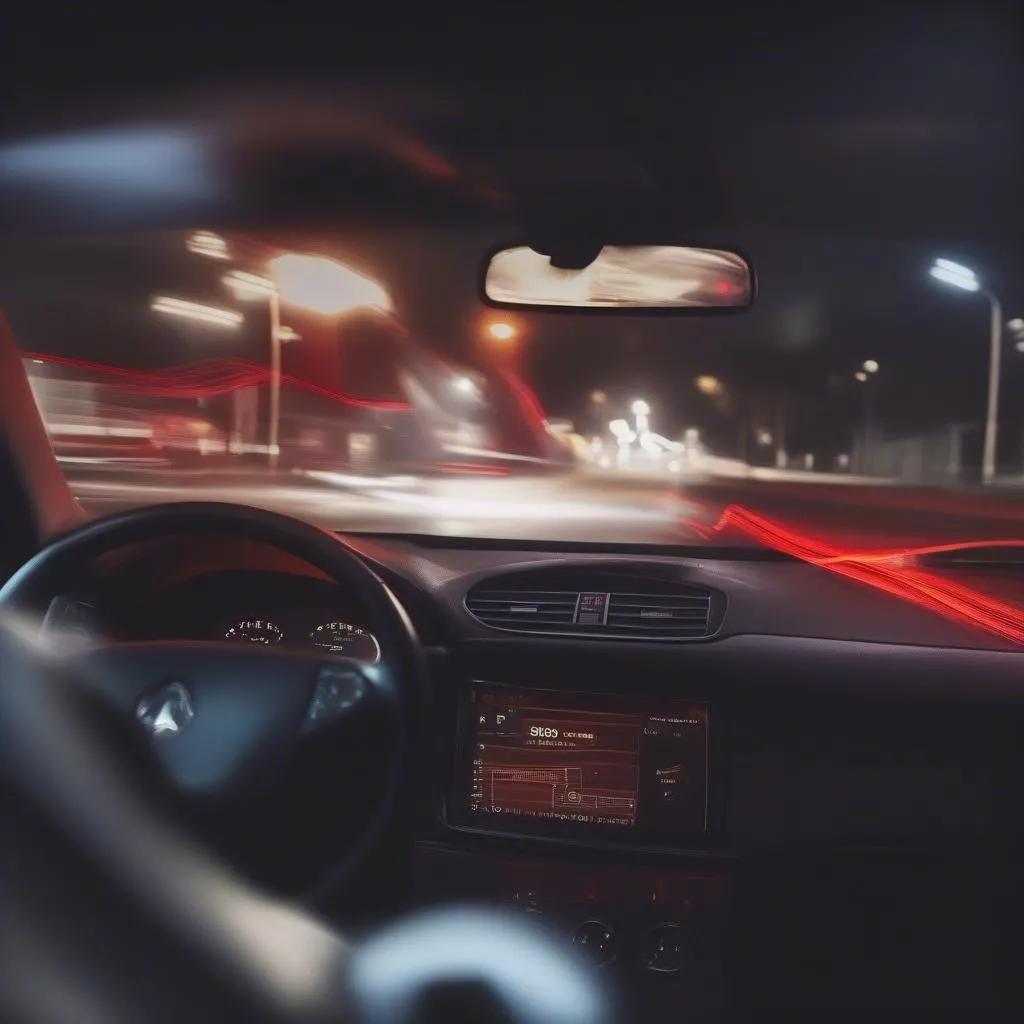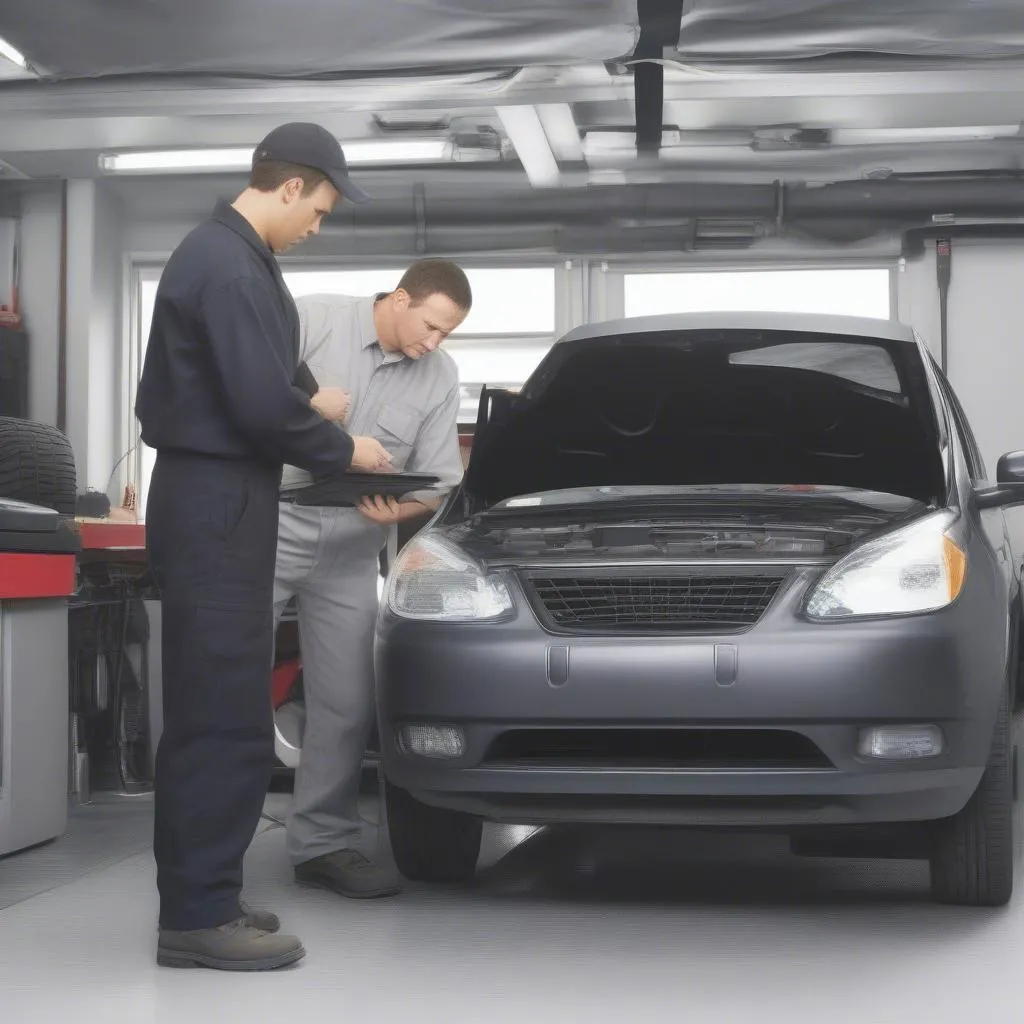You’re driving down the road, enjoying the scenery, when suddenly your ABS and brake lights come on. You pull over and check your brakes, but everything seems to be working fine. What’s going on?
It can be a frightening experience, especially since your ABS system is critical for safety in an emergency. But don’t panic! There are several reasons why your ABS and brake lights might be on, and most of them are relatively easy to fix.
What Does it Mean When Your ABS and Brake Lights Are On?
When your ABS and brake lights come on, it means that there’s a problem with your Anti-lock Braking System (ABS). The ABS system uses sensors to monitor the speed of each wheel, and if it detects that a wheel is locking up, it will automatically release the brakes to prevent a skid. This can help you maintain control of your car in slippery conditions.
From a mechanic’s perspective: This error is usually caused by a problem with one or more of the sensors in your ABS system. This can include:
- A faulty wheel speed sensor: This is the most common cause of ABS and brake lights coming on. Wheel speed sensors are used to measure the speed of each wheel, and if one of these sensors fails, the ABS system will be unable to function properly.
- A problem with the ABS module: The ABS module is the brain of the ABS system. If the module itself fails, it can cause the lights to come on.
- A problem with the wiring: There are many wires that connect the ABS system to other parts of your car, and if one of these wires becomes damaged, it can cause the lights to come on.
- A problem with the brake fluid level: The brake fluid level sensor is located in the brake fluid reservoir. If the brake fluid level is low, it can cause the ABS and brake lights to come on.
From an engineering perspective: It’s important to understand how your car’s braking system works to diagnose the issue. Your ABS system uses sensors to monitor the speed of each wheel. If the system detects that a wheel is locking up, it will automatically release the brakes to prevent a skid. These sensors are crucial to the functionality of your ABS system. They are connected to a computer, which can be the source of the problem, or can simply be the result of a failed sensor.
From an economic perspective: Failing to address this issue can be costly, as driving with a faulty ABS system is extremely dangerous. Replacing parts, especially those connected to your vehicle’s safety features, is expensive. It’s always better to get your car checked as soon as possible to prevent further damage.
Why Is My ABS and Brake Light On? Possible Causes and Solutions
1. Faulty Wheel Speed Sensor
Common scenarios:
- You hear a clicking noise coming from your wheels. This is a common sign of a faulty wheel speed sensor, which is a crucial part of your car’s Anti-lock Braking System (ABS). The sensor is responsible for measuring the speed of your wheels, and when it goes bad, it often makes a clicking noise.
- You’re driving on a rough road or through a lot of puddles. Road debris and water can damage the wheel speed sensor, leading to the ABS and brake light to come on.
Solution:
- Replace the faulty sensor. You can usually find replacement sensors at your local auto parts store or online. If you’re comfortable working on your car, you can replace the sensor yourself. Otherwise, take it to a mechanic to have it repaired.
2. Problem with the ABS Module
Common scenarios:
- You’ve recently been in an accident or your car has been exposed to extreme weather conditions. This can damage the ABS module.
- Your car is older and has accumulated a lot of mileage. The ABS module can fail over time.
Solution:
- Diagnose the issue. A mechanic can use a scan tool to check the ABS module for any error codes.
- Replace the ABS module. If the ABS module is faulty, it will need to be replaced. This is a more complex repair and will likely require a visit to a specialized mechanic.
3. Problem with the Wiring
Common scenarios:
- You’ve recently had work done on your brakes or suspension. This can damage the wiring connected to the ABS system.
- Your car is exposed to extreme temperatures or weather conditions. This can cause the wiring to become brittle and break.
Solution:
- Inspect the wiring. Check the wiring for any signs of damage.
- Repair or replace the damaged wiring. You may be able to repair the wiring yourself, but it’s a more complex job than replacing a sensor. If you’re not comfortable working on your car, take it to a mechanic to have the wiring repaired.
4. Problem with the Brake Fluid Level
Common scenarios:
- You’ve recently had your brakes serviced. This is a common time for the brake fluid level to be checked.
- You’ve been driving your car for a long time without checking the brake fluid level. Brake fluid can evaporate over time, and if the level gets too low, the ABS and brake lights will come on.
Solution:
- Check the brake fluid level. Top off the brake fluid if necessary.
- Inspect the brake fluid reservoir. Look for leaks or signs of contamination.
What to Do When Your ABS and Brake Light Come On?
- Don’t Panic. It’s important to remain calm when your ABS and brake light come on. The lights coming on doesn’t necessarily mean that your brakes are not working.
- Pull over to a safe location. Once you’re in a safe location, you can check the brake fluid level and look for any leaks.
- Get your car diagnosed. If you’re not comfortable checking the brake fluid level or looking for leaks, take your car to a mechanic to have it diagnosed.
- Do not ignore the problem. Driving with a faulty ABS system is dangerous. It’s important to get your car checked as soon as possible to prevent a potentially dangerous situation.
What Happens if I Don’t Fix The Problem?
Ignoring a faulty ABS system can be dangerous. Without the safety net of your ABS, your car may be more prone to skidding, especially during emergency braking situations. This could lead to a loss of control and increase the risk of accidents.
Common questions:
- Can I still drive with the ABS and brake light on? You can, but it’s not recommended. Driving with a faulty ABS system is dangerous and can lead to a loss of control during an emergency braking situation.
- Will the ABS light go off on its own? In some cases, the light may go off on its own if the problem is minor, but this is not always the case.
- What if my ABS and brake lights come on and my brakes feel spongy? This could indicate a serious problem with your brakes. You should have your brakes inspected by a mechanic as soon as possible.
- Is it safe to drive my car if the ABS light is on and the brakes are working? It’s not safe to drive your car if the ABS light is on, even if the brakes are working. This is because the ABS system is designed to help you stop in an emergency, and without it, your car will be more prone to skidding.
- How much will it cost to fix the problem? The cost of fixing the problem will depend on the cause. It could be as simple as replacing a faulty wheel speed sensor, or it could be more complex, such as replacing the ABS module.
Other Resources
For more information on how to diagnose and repair ABS system issues, check out our articles on:
- How To Use Innova Code Reader 3011
- How To Use A Code Reader
- Innova 3011 Codes
- Innova ABS SRS Scan Tool
- Innova App
 car-brake-light-on
car-brake-light-on
What Should I Do Next?
If you’re experiencing ABS and brake lights coming on, the best course of action is to get your car diagnosed by a mechanic. They can use a scan tool to identify the problem and recommend the best course of action.
If you’re looking for more information about diagnosing and repairing ABS system issues, be sure to check out our other articles.
We have professional car repair experts available 24/7 via WhatsApp at +84767531508 to help you with your car’s diagnostics and repairs.
 mechanic-inspecting-car-brakes
mechanic-inspecting-car-brakes
Leave a comment below and tell us about your experience with ABS and brake light issues!